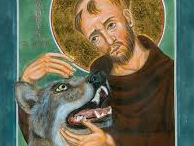
The Wolf of Gubbio
According to legend, around the year 1220 when St. Francis of Assisi was living in Gubbio, Italy, a fierce wolf began attacking livestock. And then it began attacking humans.
It waited outside the city gates for anyone foolish enough to venture beyond them alone. No weapon was capable of subduing the wolf and anyone who tried to destroy it was attacked.
Eventually, the public refused to go outside the city walls. Francis announced he was going to meet the wolf. When he neared the wolf’s den, a small crowd accompanying him stayed back but was close enough to witness what happened.
Placing Its Head in His Hands
The wolf rushed at Francis with its jaws open, the story goes. Francis made the sign of the Cross and commanded the wolf to cease its attacks in the name of God, at which point the wolf trotted up to him docilely and lay at his feet, placing its head in his hands.
“Brother wolf,” said Francis, “you have done much evil in this land, destroying and killing the creatures of God without his permission…. but I will make peace between them and you….” He promised that the people of the city would feed the wolf each day if the wolf promised never to again attack people or animals. To show his agreement, the wolf placed one of its forepaws in Francis’ outstretched hand.
A great story, you might say, but of what use? In my view, it provides an opportunity to think about humans’ relationship with the rest of creation and how it fits into our search for God.
Isn’t it ironic that in an era when pet ownership, and expenditures for pets, are at an all-time high, we humans seem to be mostly indifferent to the danger in which the rest of creation finds itself? We love our pets but are disinterested in the extinction of other animals and the health of the planet.
Around 450 Percent
The online site, Statista, which follows marketing trends, reports that pet industry expenditures in the U.S. were estimated to reach around $75.4 billion in 2019, growing by around 450 percent since 1994. In 1988, around 56 percent of American households owned one or more pets; in 2017, that had grown to 68 percent.
St. Francis, I believe, would be happy that more people have animals as pets but his message went way further, providing a lesson on how people searching for God should view the rest of creation.
The earth is losing animal species at 1,000 to 10,000 times the natural rate, according to the Center for Biological Diversity. As many as 30 to 50 percent of the planet’s species may be extinct by 2050. The natural rate is around one to five species lost each year.
Few weeks go by without a new report showing the disastrous effects of human activity on our planet. Among the most recent is the report by the Intergovernmental Panel on Climate Change, which assesses the impacts of climate change on ocean, coastal, polar and mountain ecosystems, and the human communities that depend on them.
Urgency
The report underscores the urgency of prioritizing “timely, ambitious and coordinated action” to address “unprecedented” and enduring changes in the ocean and frozen areas of the earth.
I know that some people love their pets AND care about the environment. But according to research, protecting the environment has become a partisan issue with many people adopting an attitude toward the crisis that humans formerly had toward animals.
“We have come to see ourselves as her lords and masters, entitled to plunder her at will,” writes Pope Francis about our common home. Francis, who chose the papal name of the famous saint from Assisi, added, “The violence present in our hearts, wounded by sin, is also reflected in the symptoms of sickness evident in the soil, in the water, in the air and in all forms of life.”
An authentic search for God includes a desire to be God-like, emulating the loving creator of everything, who according to Genesis, sees creation as good and worthy of protection.



